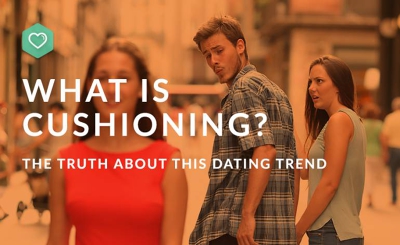
While we may not know what cushioning is when we hear the term, many of us are doing it without even realizing it. The trend of stringing along past or potential partners while in a committed relationship sounds horrible, right? But if we think about it for a moment and are honest, at some point we have all been in a relationship in which we have had a flirty rapport with a classmate on Facebook or liked every selfie an ex posted on Instagram in hopes of keeping them interested just in case. It seems innocent enough, doesn't it? We're not planning to cheat or to leave our significant other, so what harm can cushioning do to our relationship? Unfortunately, a lot of damage is done with cushioning, as we find significance in other potential romantic and sexual partners we devalue our current partner and as each relationship holds a significance, the committed real relationship becomes increasingly insignificant.
We can not be committed to one relationship when we are also constantly worried about that relationship coming to an end and in that sense cushioning will destroy the meaningfulness and value of a relationship that has potential to grow if we can put out faith into that growth and nurture it rather than undermine its value.
When we hear the term cushioning, it sounds cute and comfy, doesn't it? And we do use this tactic to keep us comfortable, to relay our fears of being ghosted, dumped, abandoned so in a sense it does the job we ask of it. However, imagine the discomfort of your boyfriend or girlfriend who has put their trust in you discovering that you are seeking reassurance from other potential partners? What would the impact be to the relationship when a partner finds a chat or texts that are clearly not appropriate for someone in a monogamous relationship? The pain and discomfort we can create for another person and for ourselves when we stray from our relationship into cushioning behavior is likely to be much worse then the simulated comfort we achieved through carrying on in pursuing other back up partners.

Some people admit they can never move on from this realization in a relationship, they feel betrayed and ultimately end it and others say that while they might remain together their trust is never fully restored and they may, in fact, begin CUSHIONING behaviors themselves because they become unsure of whether their relationship will last. That is a lot of discomfort caused by something that seemed so innocent and cannot possibly outweigh the temporary comfort it provides.

Every relationship defines infidelity by its own terms and what is acceptable in one relationship can be a deal breaker in another relationship but for most committed and monogamous couples cheating is clear-cut. Imagine being in a happy and committed relationship only to find out that the other person in your life has been cushioning their love life with multiple suitors just in case the flame went out between the two of you? Most men and women would not be happy about this and many would say they consider it to be cheating. While cushioning may not be a physical infidelity, it can definitely be understood as emotional cheating which is held in the same regard by many couples who don't differentiate between the two.
When we send and receive private messages that we would be embarrassed for our partners to read, we are really walking a fine line with our integrity and fidelity. Imagine the heartbreak one feels when they witness their significant other reading a message and a smile coming across their face, their eyes lighting up only to find out this message was from one of their partners many back up partners. If we are not comfortable with our partner seeing a message or online activity, it is likely that activity could be deemed as cheating.
There are some new dating faux pas terms that we are all becoming acquainted with whether we do them ourselves or have had them done to us! We all know that ghosting hurts, sometimes everything seems to be going fine with a new romance and after a few dates it's radio silence, you don't get a reply back and you have no idea what you've done wrong or whether it is even you. On the other hand, many of us admit to finding ghosting easier than a messy breakup. Breadcrumbing, the practice of stringing someone along here and there with a text or like but in a noncommittal way keeps us in the game without having to fully commit to dating and... maybe we're dating already. In this sense, CUSHIONING can look a lot like breadcrumbing. Cushioning is another noncommittal way in which we string people along with as much as a flirtatious message or as little as alike beneath a photo on social media. While all of these contemporary dating phrases are common they are not helpful in creating and maintaining real and lasting relationships. These tactics find their footing in the lack of and fear of commitment that will ruin a good dating relationship.
There are those of us who believe in complete transparency and those of us who believe that a certain amount of secrecy can add spice to a relationship. Whether it is flirting with a teller at a bank, buying drinks for someone at a bar or texting an old flame here and there this behavior can lead to dire consequences in a relationship. When we reach out beyond our relationship for approval, comfort, and security we are also jeopardizing those bonds in our committed relationship. Cushioning is a way we might feel like we can regain a spark to bring back to our relationship, that momentary excitement we might find in flirting with another person can make us feel invigorated and we bring that feeling back to our relationship so, what is the harm? The problem is that while that may be true for some, CUSHIONING can become a habit that we can't break, once we begin to find new and interesting ways to feel a romantic spark by cushioning our love life with extra possibilities and flirtations it can actually become difficult to go back to our relationship and doing the work needed to keep the flame alive without external help and that is the real danger.
When we think about infidelity in relationships, we often think of men as the cheating party but while men are a little bit ahead in the polls the fact is that statistically men and women cheat almost the same amount in reality. This is true of cushioning as much as it is of any other form of infidelity if the anecdotal evidence is to be believed. In fact in studies, some female participants have reported CUSHIONING well into a happy and committed relationship. In the age of social media prevalence, it is easier than ever to seek out gratification and acceptance in the object of our desire through something as simple as a well-worded compliment in someone's inbox. While men admitted to being more likely to make the first move in this regard, women admit to being swayed by these types of advances frequently, when this cushioning takes on a long-term hold it is women who say that the online infidelities tend to be of a romantic and supportive nature with more males reporting to using the communication to elicit conversations of a sexual nature. Regardless of the intention both men and women are participating in cushioning.
While CUSHIONING is a term that relates to people stringing along potential partners as a kind of insurance in the case that things fall apart with a current partner, there may be more to it than this. The desire to have a committed and happy relationship and a no strings attached fling on the side has permeated the minds of men and women since Eve bit the apple and has captured the minds of writers, filmmakers, and artists for centuries. Is it possible that cushioning might be a low key fling for those of us out there who don't have the heart to have a real life in person affair? Some people believe that to define cushioning as simply an insurance policy is underestimating the seriousness of the behavior and that while there is no in-person sexual affair involved that there is a living out of that desire on our phones and laptops if not in the flesh. Whatever we think about the psychology behind this behavior we can be assured it is not healthy to keep such serious secrets in an open and honest relationship. It probably doesn't need to be said that we cannot have both the cake and the experience of tasting cake in a committed relationship.
When we think of CUSHIONING we think of the ego that needs to keep potential mates warmed up on the side in the case of the eventual collapse of their current relationship, we think of the mean and cruel reality of modern dating. But is cushioning ever okay in a relationship and is there cases in which it is acceptable? It may come as a surprise to know that there are couples who accept and expect a certain amount of cushioning to be part of any relationship and because they themselves partake in this dating behavior they both assume and accept the same behavior of their partner. While terms such as benching, breadcrumbing, ghosting and cushioning are relatively new to most of us there are those who started dating during the rise of these dating phenomenon and accept this behavior as the norm without questioning it. these couples are likely to be younger and more comfortable with the morals and values of a younger generation of daters, older generations still find themselves uncomfortable upon reentering the dating scene where CUSHIONING is prevalent but there are many young men and women who actually see it as part of a normal relationship.
Okay so we are being facetious, (or are we?) but sometimes it can feel as though the end of the world of dating and committed relationships is approaching! With terms like cushioning becoming part of our everyday dating language and less priority on transparency and trust in our dating relationships are we truly headed for an end to dating as we know it? While it is true that the terminology has changed and popular slang changes with each passing year, there doesn't seem to be any evidence which would suggest that people are less faithful today than they have been in previous generations and in fact the prevalence of dating apps, advice vloggers and dating culture itself, we can't conclude that any such apocalypse is approaching. Funnily enough, CUSHIONING portrays a generation so insecure about its romantic future that it potentially destroys healthy relationships while holding on to any attention for security, while this in itself is unhealthy behavior, it also shows a strong need for security, love, and commitment. It is quite possible we will see these daters mature into the most transparent and loyal daters in history.
This is a very personal choice, obviously, whether you view cushioning as outright cheating or as an unfortunate reality in today's dating culture, you will likely have a decision to make regarding how you will approach this. In relationships which are monogamous and a commitment to openness and transparency has been made, CUSHIONING will likely come as a painful shock, it will be akin to being cheated on and the relationship will need openness and possibly therapy to rebuild trust if both parties are committed to continuing. However cushioning may not be seen as an infidelity, so much of as an insecure tick for other couples and may be discussed or not but will not likely destroy the connection they have.
Did we teach you a thing or two? If you still haven't learned your lesson, then why not take a peek at our other fabulous relationship advice guides NOW RIGHT HERE!
Ever wondered what "caspering" is? Find out now by reading our article HERE!!